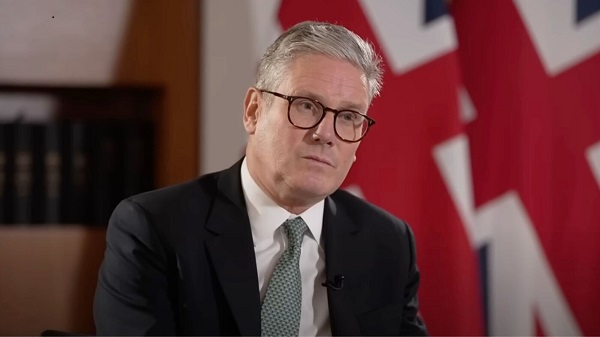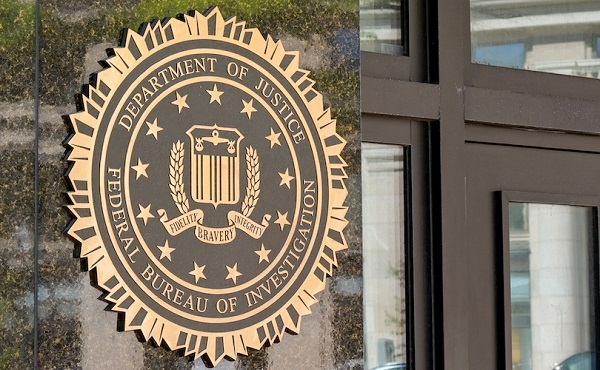Censorship Industrial Complex
UK Could Weaken Online Censorship Law To Avoid US Trade Battle

|
As European leaders scramble to shield their economies from impending US tariffs, the UK’s Labour government appears ready to make significant concessions. Facing the risk of economic fallout, Prime Minister Keir Starmer’s administration has reportedly signaled to Washington that it is open to revising the controversial and dangerous Online Safety Act — legislation critics have described as an aggressive censorship regime.
The Act, which gives UK regulators the power to fine tech companies for failing to remove vaguely defined “harmful content,” has been a major point of contention between the two allies and has become a major threat to free speech online. The Trump administration has been especially vocal in its opposition, viewing the law as an affront to free speech and a potential financial burden on US tech giants.
According to The Telegraph:
“Downing Street is willing to renegotiate elements of the Act in order to strike a trade deal, should it be raised by the US, The Telegraph understands. The law has been heavily criticized by free speech advocates and economists, who argue its broad provisions to tackle harmful online content could lead to excessive censorship and deter investment from American tech giants.”
The Online Safety Act arms UK media regulator Ofcom with sweeping new authority over social media platforms, enabling the imposition of multimillion-pound fines for failing to police content according to government directives. While supporters claim the law is necessary to protect users, critics argue that its vague wording and punitive approach encourage preemptive censorship — where platforms remove lawful content simply to avoid regulatory punishment.
President Donald Trump’s return to the White House has intensified scrutiny of the law. The president, who has been highly critical of social media censorship, has surrounded himself with influential voices in the tech world, including Elon Musk, whose platform, X, is already preparing to challenge Ofcom’s authority.
“Another source close to the Trump’s (sic) administration suggested the act was viewed as ‘Orwellian’ in the US and could become a flashpoint in negotiations. ‘To many people that are currently in power, they feel the United Kingdom has become a dystopian, Orwellian place where people have to keep silent about things that aren’t fashionable,’ they said. ‘The administration hate it [Online Safety Act]. Congress has been saying that [it is a concern] ever since it was enacted. Those in the administration are saying the exact same thing.’”
Musk has publicly condemned the Act, and with Ofcom set to gain new enforcement powers in March, tensions between US tech firms and the UK government are likely to escalate. The entrepreneur recently welcomed Trump’s presidency as a potential counterweight to the UK’s regulatory crackdown.
Free speech advocates on both sides of the Atlantic have long warned that Britain’s approach to online regulation represents a stark departure from the First Amendment protections enjoyed in the US. The Free Speech Union and groups like the Electronic Frontier Foundation (EFF) argue that the law’s restrictions on “harmful but legal” speech will lead to widespread content suppression, limiting open debate and investigative journalism.
Lord Young of Acton, the founder of the Free Speech Union, underscored the looming confrontation between UK regulators and US tech leaders:
“If that happens, Trump will side with his tech bros and tell Sir Keir that if he wants a trade deal, he’ll call off his dogs.”
Labour has previously doubled down on online regulation, with its election manifesto promising additional measures to “keep everyone safe online.” However, in the face of potential US trade repercussions, the government’s stance appears to be softening.
From Washington’s perspective, the Online Safety Act has become an obstacle to trade negotiations, raising concerns that UK regulatory overreach could deter American investment. Andrew Hale, a trade policy expert at the Heritage Foundation, confirmed that this issue has been a recurring theme in discussions with US officials.
“Every meeting I have to discuss trade policy with people either in the administration or Congress, they always raise that. They say, ‘This is a huge roadblock’.”
With Ofcom’s enforcement powers set to take effect soon, Britain faces a fundamental choice: cling to its stringent online censorship policies or prioritize economic cooperation with the US. The decision could shape the future of free speech in the UK for years to come.
|
|
|
|
You subscribe to Reclaim The Net because you value free speech and privacy. Each issue we publish is a commitment to defend these critical rights, providing insights and actionable information to protect and promote liberty in the digital age.
Despite our wide readership, less than 0.2% of our readers contribute financially. With your support, we can do more than just continue; we can amplify voices that are often suppressed and spread the word about the urgent issues of censorship and surveillance. Consider making a modest donation — just $5, or whatever amount you can afford. Your contribution will empower us to reach more people, educate them about these pressing issues, and engage them in our collective cause. Thank you for considering a contribution. Each donation not only supports our operations but also strengthens our efforts to challenge injustices and advocate for those who cannot speak out. Thank you.
|
Censorship Industrial Complex
Global media alliance colluded with foreign nations to crush free speech in America: House report

From LifeSiteNews
By Dan Frieth
The now-defunct ad coalition GARM shared insider data and urged boycotts of Twitter to punish non-compliance with its ‘harmful content’ standards, a US House Judiciary report shows.
A new report from the U.S. House Judiciary Committee has shed light on what it describes as an alarming collaboration between powerful corporations and foreign governments aimed at suppressing lawful American speech.
The investigation focuses on the Global Alliance for Responsible Media (GARM), an initiative founded in 2019 by the World Federation of Advertisers (WFA), which the committee accuses of acting as a censorship cartel.
According to the report, GARM, whose members control about 90 percent of global advertising spending, exploited its market dominance to pressure platforms like Twitter (now X) into compliance with its restrictive content policies.
A copy of the report can be found HERE.
The committee highlighted how GARM sought to “effectively reduce the availability and monetization” of content it deemed harmful, regardless of public demand for free expression.
Documents obtained by the committee reveal direct coordination between GARM and foreign regulators, including the European Commission and Australia’s eSafety commissioner.
In one exchange, a European bureaucrat encouraged advertisers to leverage their influence to “push Twitter to deliver on GARM asks.”

Similarly, Australia’s eSafety Commissioner Julie Inman Grant praised GARM’s “significant collective power in helping to hold the platforms to account” and sought updates to “take into account in our engagement and regulatory decisions.”

Robert Rakowitz, GARM’s co-founder and initiative lead, expressed a chilling goal in private correspondence, stating that silencing President Donald Trump was his “main thing” and likening the president’s speech to a “contagion” he aimed to contain “to protect infection overall.”

The report outlines how GARM distributed previously unavailable non-public information about Twitter’s adherence to its standards, fully aware this would prompt advertisers to boycott the platform if it failed to conform. According to the House report, Rakowitz admitted that this information sharing was designed to encourage members not to advertise on Twitter.
He went as far as to draft statements urging GARM members to halt advertising on the platform, telling colleagues he had gone “as close as possible” to saying Twitter “is unsafe, cease and desist.”
Despite the widespread impact of GARM’s actions, including what the committee describes as coerced “concessions” from platforms, internal polling circulated within GARM showed that “66 percent of American consumers valued free expression over protection from harmful content.”
Still, GARM pressed ahead with efforts to “eliminate all categories of harmful content in the fastest possible timing,” ignoring consumer preferences.
Even after GARM dissolved in 2024 amid legal challenges, similar efforts persisted.
A new coalition led by Dentsu and The 614 Group briefly attempted to revive GARM’s mission before disbanding under scrutiny. Gerry D’Angelo, a former GARM leader, reflected on the initiative’s overreach, stating, “Did we go too far in those first rounds of exclusionary restrictions? I would say yes.”
The Judiciary Committee warns that despite GARM’s downfall, the threat of collusion to stifle free expression remains.
It pledged to continue oversight to defend “the fundamental principles” of the Constitution and ensure that markets, not coordinated censorship efforts, shape the flow of information in the digital age.
Reprinted with permission from Reclaim The Net.
Censorship Industrial Complex
FBI urged to release withheld records on Hunter Biden laptop, other ‘Twitter Files’

From LifeSiteNews
By Dan Frieth
Judicial Watch initiated the lawsuit in April 2023, targeting the DOJ, the Department of Homeland Security, and the Office of the Director of National Intelligence
A hearing took place Wednesday, before U.S. District Judge Sparkle L. Sooknanan, in a Freedom of Information Act (FOIA) lawsuit brought by Judicial Watch against the Department of Justice (DOJ).
The case seeks records related to the “Twitter Files,” particularly those involving Hunter Biden’s laptop and allegations of censorship.
The only matter still pending is the FBI’s withholding of records detailing two meetings between agency officials and Twitter representatives from the Biden administration.
Judicial Watch initiated the lawsuit in April 2023, targeting the DOJ, the Department of Homeland Security, and the Office of the Director of National Intelligence.
The legal action followed the FBI’s failure to respond to a December 2022 FOIA request for communications between FBI personnel and key Twitter figures, including Yoel Roth, Vijaya Gadde, and Jim Baker, from June 2020 to December 2022.
These individuals were involved in discussions about suppressing the New York Post’s Hunter Biden laptop story, as disclosed in journalist Matt Taibbi’s December 2022 “Twitter Files.”
Tom Fitton, president of Judicial Watch, expressed strong disappointment: “It is frustrating beyond belief for Judicial Watch to have to go to federal court for basic information on Biden’s abuse of the FBI, using Twitter to censor and monitor Americans.”
Through a mix of FOIA requests and legal action, Judicial Watch continues to document extensive censorship efforts that affected tens of millions of Americans.
In November 2024, it obtained DHS records showing a widespread campaign, by both government and private groups, to police and suppress social media posts concerning election fraud in 2020.
Additional records from June 2024, released through Judicial Watch litigation, revealed that just before and after the 2020 election, state officials flagged alleged misinformation and sent it to entities like the Center for Internet Security, CISA, and the Election Integrity Partnership (EIP), a DHS-backed nonprofit known for targeting online election discourse.
In December 2023, DHS documents exposed coordination between CISA and the EIP to conduct “real-time narrative tracking” on major social media platforms in the run-up to the 2020 vote.
Similar records surfaced in November 2023, showing EIP’s influence over platforms such as Google, Twitter, Facebook, TikTok, Pinterest, and Reddit to suppress “disinformation.”
Reprinted with permission from Reclaim The Net.
-

 Alberta7 hours ago
Alberta7 hours agoAlberta Independence Seekers Take First Step: Citizen Initiative Application Approved, Notice of Initiative Petition Issued
-

 Crime6 hours ago
Crime6 hours agoNational Health Care Fraud Takedown Results in 324 Defendants Charged in Connection with Over $14.6 Billion in Alleged Fraud
-

 Health5 hours ago
Health5 hours agoRFK Jr. Unloads Disturbing Vaccine Secrets on Tucker—And Surprises Everyone on Trump
-

 Bruce Dowbiggin8 hours ago
Bruce Dowbiggin8 hours agoThe Game That Let Canadians Forgive The Liberals — Again
-

 Alberta1 day ago
Alberta1 day agoCOVID mandates protester in Canada released on bail after over 2 years in jail
-

 armed forces1 day ago
armed forces1 day agoCanada’s Military Can’t Be Fixed With Cash Alone
-

 Crime2 days ago
Crime2 days agoProject Sleeping Giant: Inside the Chinese Mercantile Machine Linking Beijing’s Underground Banks and the Sinaloa Cartel
-

 Alberta2 days ago
Alberta2 days agoAlberta uncorks new rules for liquor and cannabis







